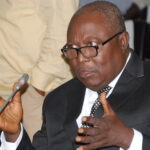Ghana’s fiscal story has always had two authors: one promising to fix the roof while setting the house on fire, and the other choosing to douse the flames with unpopular, yet effective prescriptions. But what happens when the once-mocked plumber unclogs the entire drainage system in less than four months—and still has time to fix the sink? The answer lies in the first 120 days of the Akufo-Addo administration in 2017, whose economic clarity and policy boldness rendered the 2025 return of John Mahama painfully pedestrian.
Let’s start with the facts. In his first four months, Akufo-Addo’s government abolished or reduced 13 separate taxes and levies. These weren’t symbolic touch-ups. They were structural rollbacks of burdens that were punishing businesses, inflating consumer costs, and throttling the economy. He scrapped the 1% Special Import Levy, abolished 17.5% VAT/NHIL on financial services, removed VAT on domestic airline tickets, and cancelled VAT on imported medicines. The Special Petroleum Tax was cut, spare parts were freed from import duties, electricity levies were reduced, and even the levy on ‘kayayei’ was dropped—a political message as potent as it was practical. These were not policy stunts. This was fiscal re-engineering.
In contrast, John Mahama returned to power in January 2025 on a wave of promises so vivid they bordered on populist theatre. His manifesto pledged a sweeping tax cleanse within the first 100 days: E-Levy, COVID-19 levy, 10% bet winnings levy, emissions levy, import duty on vehicles—all to be scrapped. The language was bold, the delivery emphatic. Ghanaians, worn out by pandemic-era levies and belt-tightening, dared to hope.
But by Day 120, the results were a shadow of the promises. Only 3 taxes had been removed: the 1% E-Levy, the 10% lottery winnings levy and emissions levy. Crucially, the loudest promise—scrapping import duties on vehicles—remains unfulfilled. Just as glaring is the failure to apply the Price Stabilisation and Recovery Levy on fuel to cushion consumers, a commitment that was supposed to offer immediate relief at the pumps. No executive instrument. No parliamentary motion. Not even a draft roadmap. Just echoes of a campaign trail now eerily silent.
And it wasn’t for lack of awareness. Addressing the Ghana Union of Traders Association (GUTA) in Accra, Mahama himself read aloud a startling list of levies from his cellphone: import duty, VAT, ECOWAS levy, vehicle examination fee, NHIL, special import levy, EXIM Bank levy, GETFund levy, African Union import levy, COVID-19 health levy, MOTI fees, disinfection fees—the list went on. “I am shocked,” he confessed. The room nodded. But leadership isn’t diagnosis—it’s action. And Mahama’s 2025 government, to date, has yet to remove even half the items on his own litany of complaints.
While Mahama’s government stalled, Akufo-Addo’s 2017 administration surged. Within 120 days, the macroeconomic indicators started shifting. Inflation, which stood at 15.4% in December 2016, trended downward to 11.8% by April 2017. GDP growth began climbing. The cedi steadied. Investor sentiment turned from despair to cautious optimism. Fuel prices softened as petroleum taxes were slashed. Electricity bills became less punishing. Medicines got cheaper. This wasn’t political choreography—it was economic triage.
In 2025, Mahama’s numbers told a grimmer story. The budget recorded a primary deficit of 3.9% of GDP, far off the promised 0.5% surplus. Inflation hit 23.8%, overshooting both government and IMF projections. Treasury bill rates soared to 28.19%, strangling private sector credit. Amid this bleak landscape, the NDC proposed even more freebies: free tertiary education for persons with disabilities, free sanitary pads, and the 24-hour economy plan. Laudable aspirations—but paired with revenue shrinkage and no costed plan, they read less like vision and more like delusion.
The contrast could not be starker. Akufo-Addo’s team understood a basic principle of development: before you spend, you must grow. And to grow, you must remove the weeds—tax weeds, red tape weeds, corruption weeds. They didn’t just cut taxes. They rewrote the social contract: Ghanaians deserve breathing space to produce, earn, and grow.
The NDC, on the other hand, entered 2025 on a platform of righteous indignation only to fumble when the ball was theirs. Their shift from revolutionary to resigned was so swift, it skipped explanation altogether. No update. No press briefing. Just political amnesia, hoping voters would forget the promises made as they walked into polling booths.
This is not about ideology. It’s about record. The 120-day scorecard doesn’t lie. Akufo-Addo’s government came in and executed with surgical discipline. Mahama’s return has so far yielded a whimper where there should have been thunder. While one administration set out to rewire the tax code for recovery, the other seems trapped in an echo chamber of old talking points and unkept promises.
So here we are. In this side-by-side experiment in economic leadership, one president chose action over applause. The other is still delivering speeches while the economy holds its breath. Governance is not theatre. And in this fiscal duel, the elephant didn’t just perform—it delivered. The umbrella, on the other hand, is still trying to open.




